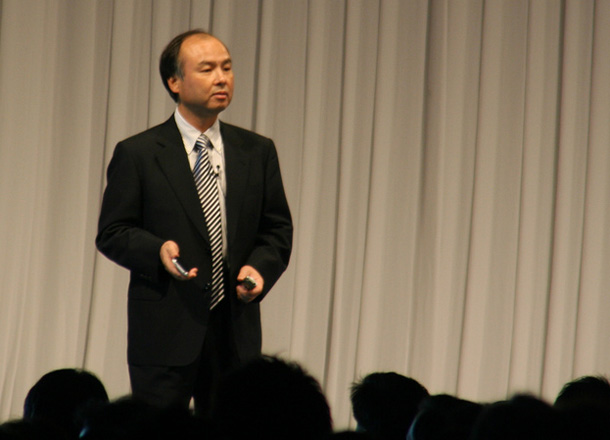SoftBank: Crazy moves give good results

MWC 2011: What mobile operators must do to avoid becoming dumb pipes...
Desperate times in the telecoms industry call for mobile operators to take "crazy measures", Masayoshi Son, CEO of Japanese mobile operator SoftBank, told delegates at the Mobile World Congress in Barcelona on Wednesday.
"Mobile carriers are becoming dumb pipes, that's the depressing reality," he said. "Apple takes all the upside, Google takes all the upside... What a headache it is. In such a headache situation, taking a crazy bet is a crazy move."

Mayasoshi Son, CEO of mobile operator SoftBank, says "sometimes craziness gives a good return"
Photo: Nobuyuki Hayashi
Mobile operators are facing saturated subscriber penetration levels and declining average revenue per user (Arpu) - leaving just two choices for boosting growth and profitability, according to Masayoshi: increase market share by poaching rivals' subscribers, or increase Arpu, "somehow".
In SoftBank's case, Masayoshi's "crazy move" was its 2006 decision to acquire Vodafone Japan for $20bn in cash, said the CEO - an acquisition the company funded almost entirely with borrowed money, at a time when it was making a billion-dollar loss every year.
"Our Arpu for the voice continued to drop down but Arpu in data started to increase and more than offset the voice Arpu. So we are one of the very few companies that start to increase the total Arpu," he said.
"Sometimes craziness gives a good return," he added.
SoftBank now has 100 per cent 3G subscribers, said Masayoshi, noting that more than half, 54 per cent, of its Arpu comes from mobile data, excluding SMS. "We totally transformed our company from voice-centric to data-centric," he said.
Masayoshi said mobile operators must transform into internet, "data-driven" companies. "100 per cent of our employees have iPads, 100 per cent of our employees have iPhones, 100 per cent wi-fi connected all around our campus and 96 per cent of our [20,000] employees have Twitter accounts," he told delegates.
"You can see your own future if you execute just like we are doing, you may have interesting solutions," he added.